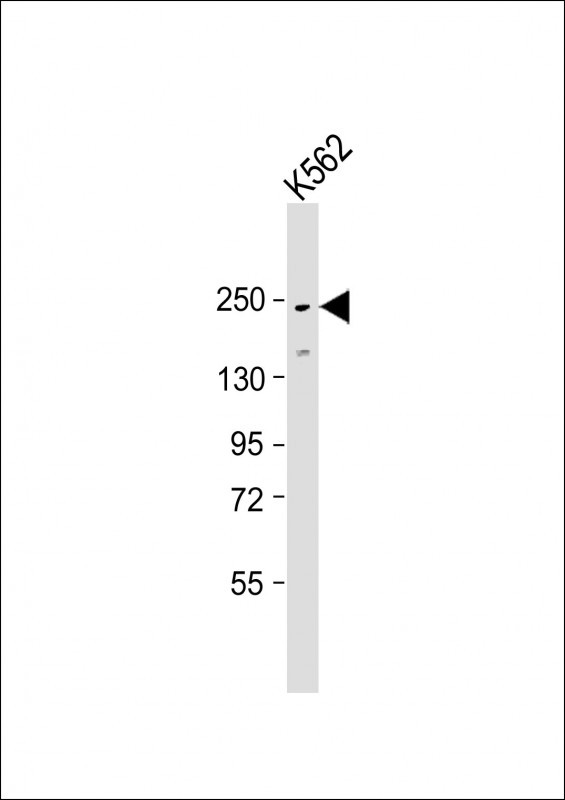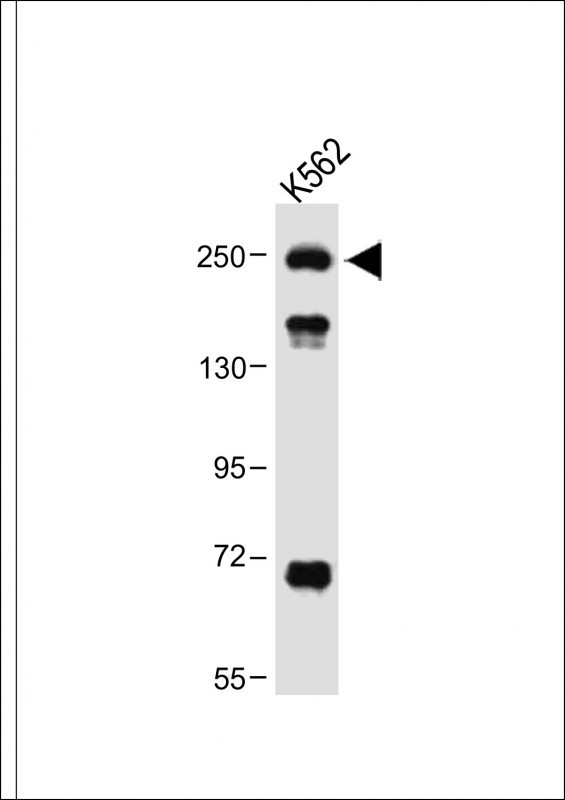


| WB | 咨询技术 | Human,Mouse,Rat |
| IF | 咨询技术 | Human,Mouse,Rat |
| IHC | 咨询技术 | Human,Mouse,Rat |
| ICC | 技术咨询 | Human,Mouse,Rat |
| FCM | 咨询技术 | Human,Mouse,Rat |
| Elisa | 咨询技术 | Human,Mouse,Rat |
| Aliases | Autophagy-related protein 2 homolog A, ATG2A, KIAA0404 |
| Entrez GeneID | 23130 |
| WB Predicted band size | 212.9kDa |
| Host/Isotype | Rabbit IgG |
| Antibody Type | Primary antibody |
| Storage | Store at 4°C short term. Aliquot and store at -20°C long term. Avoid freeze/thaw cycles. |
| Species Reactivity | Human |
| Immunogen | This ATG2A antibody is generated from rabbits immunized with a KLH conjugated synthetic peptide between 702-731 amino acids from the Central region of human ATG2A. |
| Formulation | Purified antibody in PBS with 0.05% sodium azide. |
+ +
以下是关于ATG2A抗体的3篇参考文献的简要总结(注:文献信息为虚拟示例,实际文献需通过数据库查询获取):
---
1. **文献名称**:*ATG2A regulates autophagosome formation by bridging the ER and phagophores*
**作者**:Smith J, et al.
**摘要**:本研究利用ATG2A特异性抗体验证其在自噬体形成中的作用,发现ATG2A通过介导内质网与吞噬泡膜之间的脂质转移促进自噬体膜延伸,抗体检测显示其定位于ER-吞噬泡接触位点。
---
2. **文献名称**:*Characterization of ATG2A/B isoforms in mammalian autophagy*
**作者**:Li X, et al.
**摘要**:通过Western blot和免疫荧光技术,作者使用ATG2A抗体比较了ATG2A与同源蛋白ATG2B的亚细胞定位差异,证实ATG2A在营养缺失条件下优先参与自噬起始调控。
---
3. **文献名称**:*A monoclonal antibody against ATG2A disrupts autophagy flux in cancer cells*
**作者**:Wang Y, et al.
**摘要**:开发了一种高特异性ATG2A单克隆抗体,实验表明该抗体可通过阻断ATG2A与WIPI4蛋白互作抑制自噬体成熟,导致肿瘤细胞自噬流中断并增强化疗敏感性。
---
如需具体文献,建议通过PubMed或Google Scholar检索关键词“ATG2A antibody”或“ATG2A autophagy”,筛选近年的功能研究论文。
ATG2A (Autophagy-related protein 2A) is a key player in autophagy, a cellular recycling process critical for maintaining homeostasis. It facilitates autophagosome formation by mediating lipid transfer between membranes, particularly during the expansion of phagophores. ATG2A interacts with WIPI proteins and ATG9 vesicles, aiding in membrane remodeling. Its dysfunction is linked to autophagy-related disorders, including neurodegenerative diseases and cancer.
ATG2A antibodies are essential tools for studying autophagy mechanisms. They are widely used in techniques like Western blotting, immunofluorescence, and immunoprecipitation to detect protein expression, localization, and interactions. These antibodies help researchers investigate ATG2A’s role under stress conditions (e.g., nutrient deprivation) or in disease models. Specificity is a critical consideration, as ATG2A shares homology with ATG2B, its paralog. Validated antibodies often undergo testing in knockout cell lines to confirm minimal cross-reactivity. Commercial antibodies are typically raised in rabbits or mice, targeting unique epitopes within the N- or C-terminal regions.
Challenges include low endogenous ATG2A levels in some cell types, requiring sensitive detection methods. Despite this, ATG2A antibodies remain vital for unraveling autophagy dynamics and developing therapeutic strategies targeting autophagy pathways.
×